译林版(2020)必修第二册Unit 2 Be Sporty,Be Healthy Grammar and usage 被动语态课件(共35张PPT)
文档属性
| 名称 | 译林版(2020)必修第二册Unit 2 Be Sporty,Be Healthy Grammar and usage 被动语态课件(共35张PPT) |  | |
| 格式 | pptx | ||
| 文件大小 | 5.2MB | ||
| 资源类型 | 教案 | ||
| 版本资源 | 牛津译林版(2019) | ||
| 科目 | 英语 | ||
| 更新时间 | 2024-01-10 08:52:31 | ||
图片预览

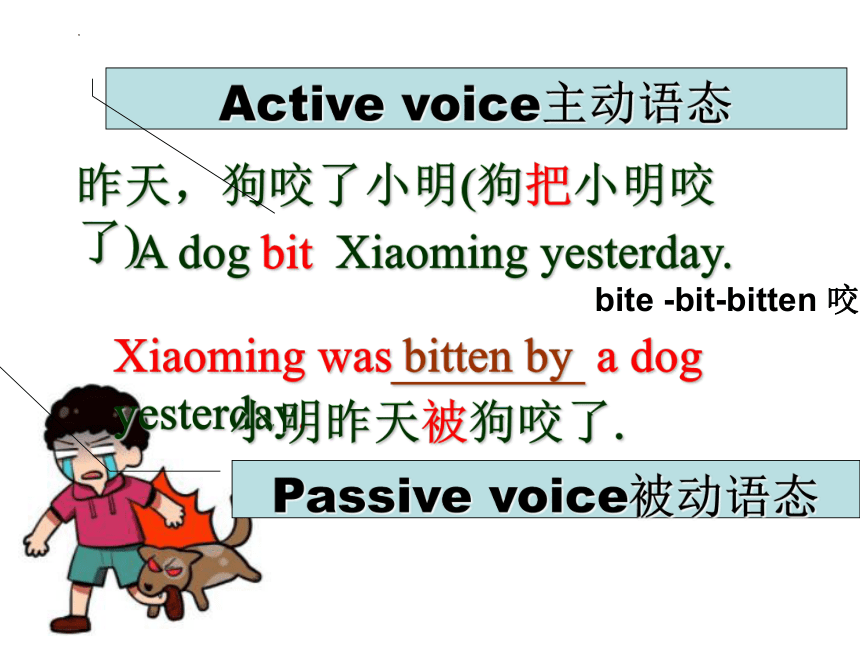
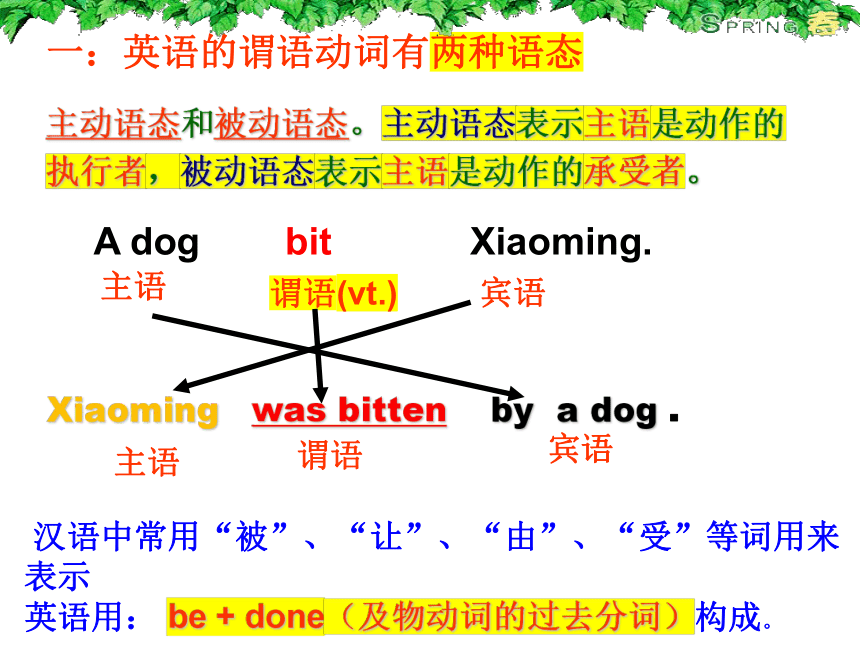
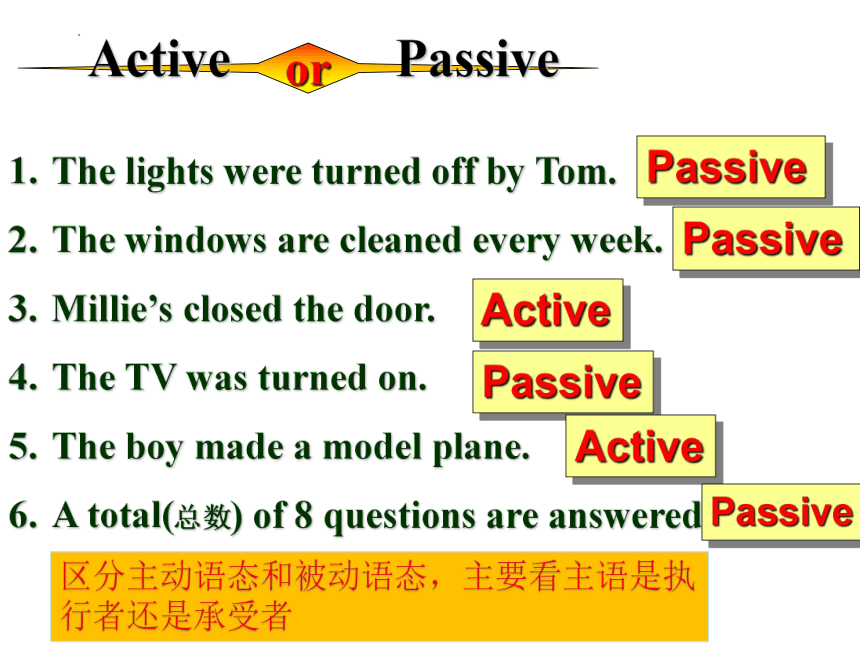
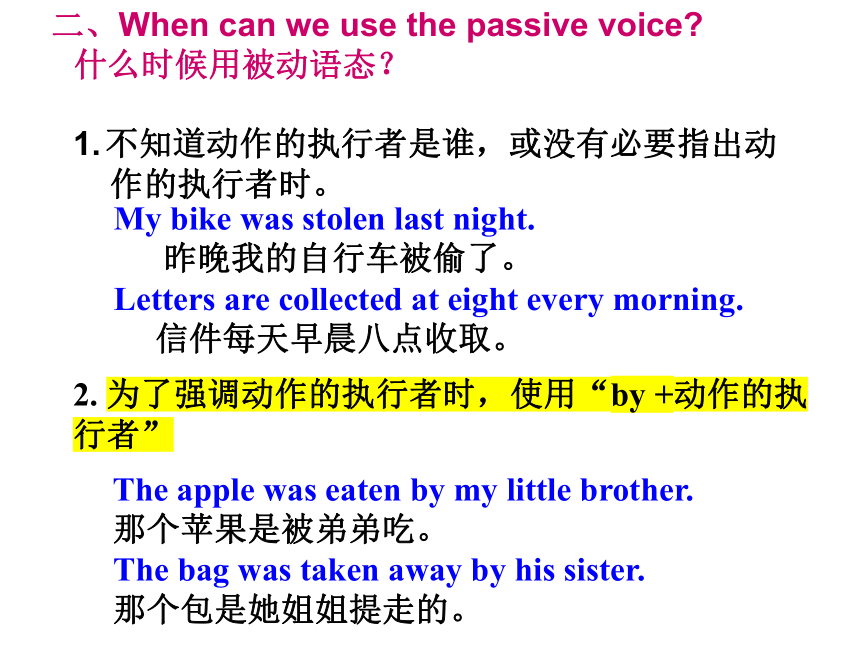
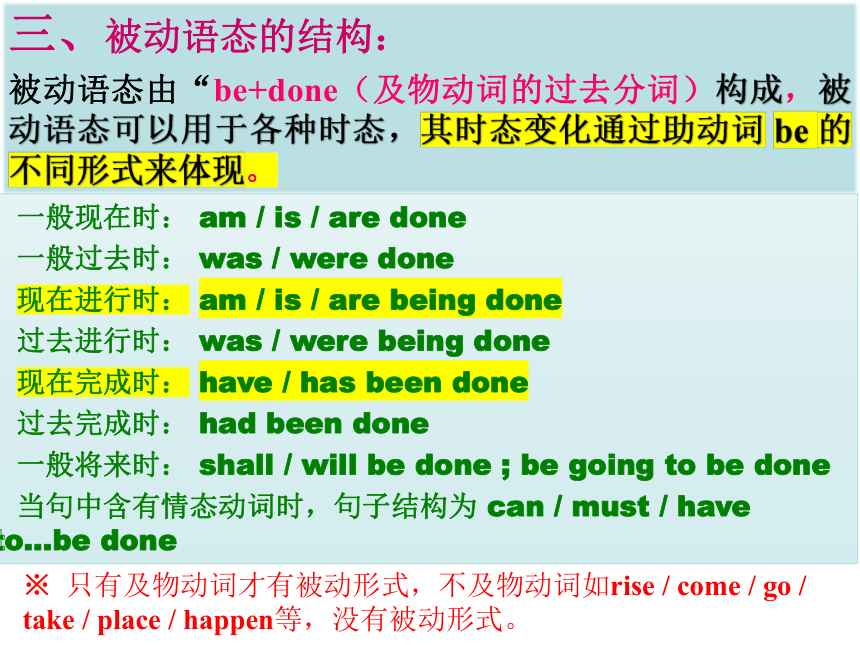
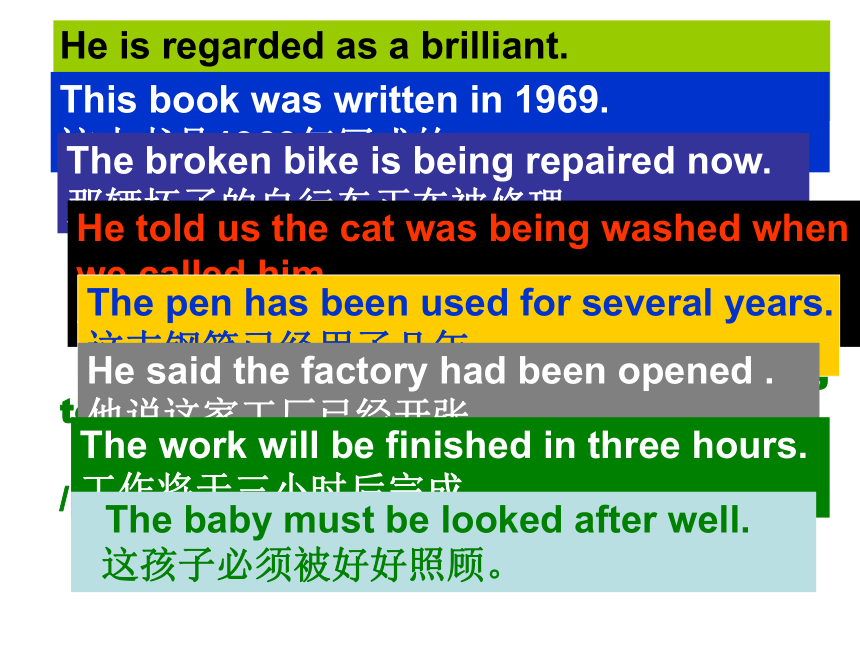
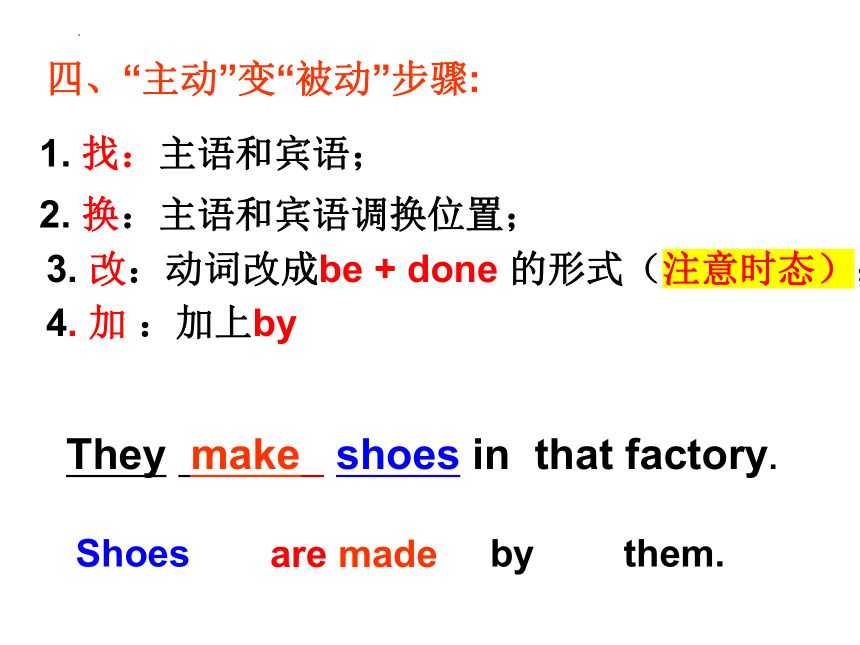
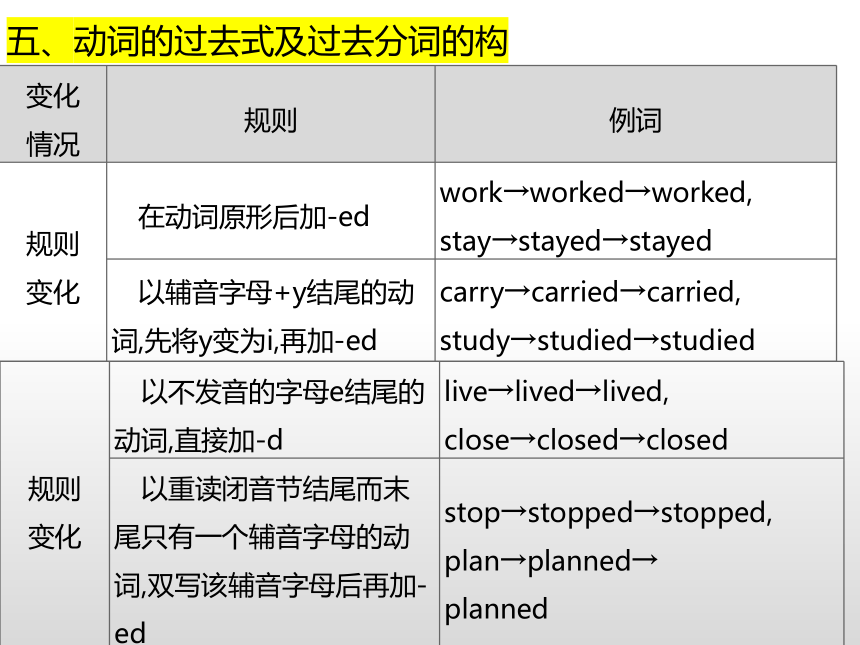
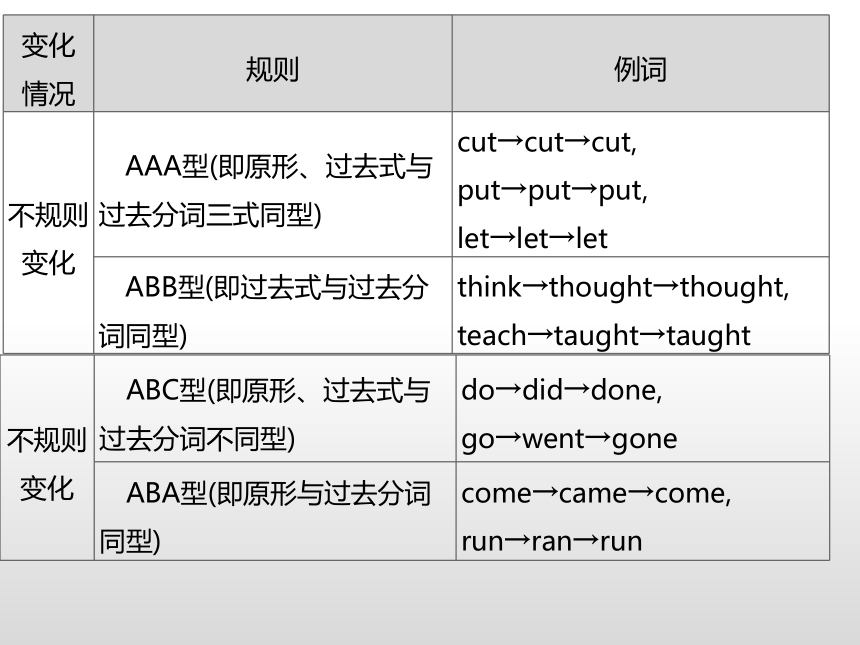
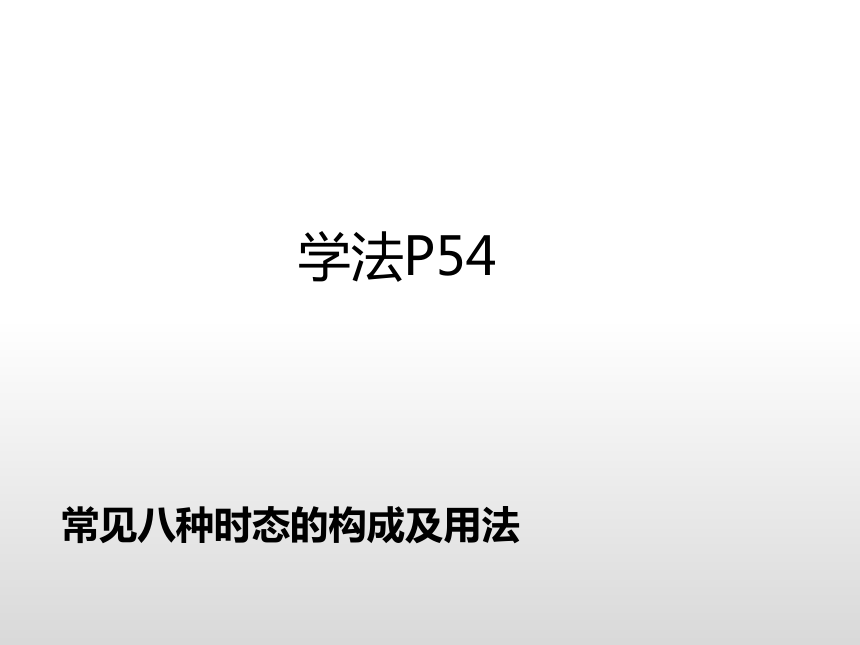
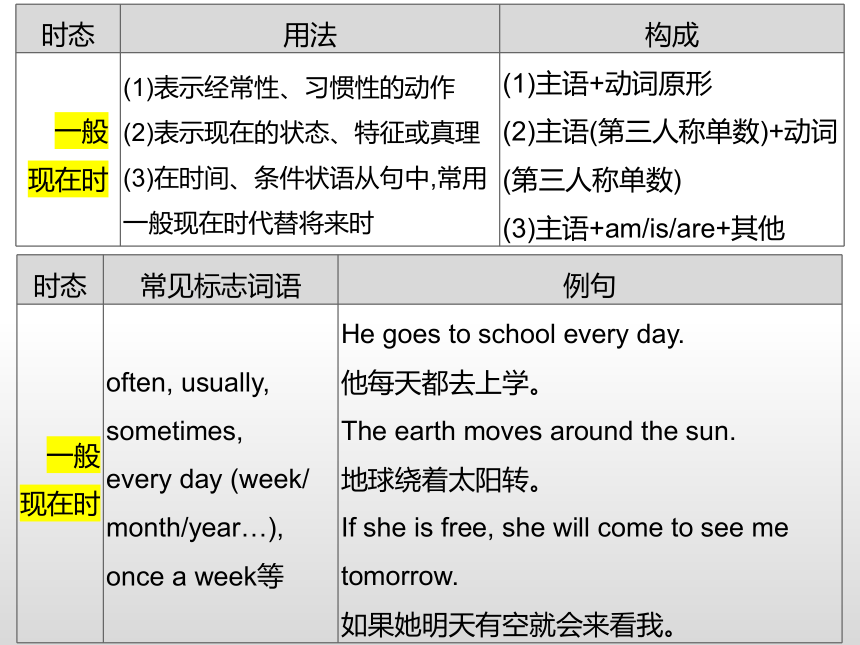
文档简介
(共35张PPT)
Passive Voice
现在进行时和现在完成时中的被动语态
Unit 2 Grammar & usage
昨天,狗咬了小明(狗把小明咬了).
Xiaoming was bitten by a dog yesterday.
Active voice主动语态
Passive voice被动语态
A dog bit Xiaoming yesterday.
小明昨天被狗咬了.
bite -bit-bitten 咬
一:英语的谓语动词有两种语态
A dog bit Xiaoming.
主语
谓语(vt.)
宾语
Xiaoming was bitten by a dog .
主语
谓语
宾语
主动语态和被动语态。主动语态表示主语是动作的执行者,被动语态表示主语是动作的承受者。
汉语中常用“被”、“让”、“由”、“受”等词用来表示
英语用: be + done(及物动词的过去分词)构成。
The lights were turned off by Tom.
The windows are cleaned every week.
Millie’s closed the door.
The TV was turned on.
The boy made a model plane.
A total(总数) of 8 questions are answered.
or
Active
Passive
Passive
Passive
Active
Passive
Active
Passive
区分主动语态和被动语态,主要看主语是执行者还是承受者
Read text-2
二、When can we use the passive voice
什么时候用被动语态?
不知道动作的执行者是谁,或没有必要指出动
作的执行者时。
My bike was stolen last night.
昨晚我的自行车被偷了。
Letters are collected at eight every morning.
信件每天早晨八点收取。
The apple was eaten by my little brother.
那个苹果是被弟弟吃。
The bag was taken away by his sister.
那个包是她姐姐提走的。
2. 为了强调动作的执行者时,使用“by +动作的执行者”
三、被动语态的结构:
被动语态由“be+done(及物动词的过去分词)构成,被动语态可以用于各种时态,其时态变化通过助动词 be 的不同形式来体现。
一般现在时: am / is / are done
一般过去时: was / were done
现在进行时: am / is / are being done
过去进行时: was / were being done
现在完成时: have / has been done
过去完成时: had been done
一般将来时: shall / will be done ; be going to be done
当句中含有情态动词时,句子结构为 can / must / have to…be done
※ 只有及物动词才有被动形式,不及物动词如rise / come / go / take / place / happen等,没有被动形式。
一般现在时: am / is / are done
一般过去时: was / were done
现在进行时: am / is / are being done
过去进行时: was / were being done
现在完成时: have / has been done
过去完成时: had been done
一般将来时: shall / will be done ; be going to be done
当句中含有情态动词时,句子结构为 can / must / have to…be done
He is regarded as a brilliant.
他被认为很有才气。
This book was written in 1969.
这本书是1969年写成的。
The broken bike is being repaired now.
那辆坏了的自行车正在被修理。
He told us the cat was being washed when we called him.
他告诉我们打电话时他正在给猫洗澡。
The pen has been used for several years. 这支钢笔已经用了几年。
He said the factory had been opened . 他说这家工厂已经开张。
The work will be finished in three hours. 工作将于三小时后完成。
The baby must be looked after well.
这孩子必须被好好照顾。
四、“主动”变“被动”步骤:
1. 找:主语和宾语;
They make shoes in that factory.
Shoes
2. 换:主语和宾语调换位置;
3. 改:动词改成be + done 的形式(注意时态);
4. 加 :加上by
are made
by
them.
五、动词的过去式及过去分词的构
变化 情况 规则 例词
规则 变化 在动词原形后加-ed work→worked→worked, stay→stayed→stayed
以辅音字母+y结尾的动词,先将y变为i,再加-ed carry→carried→carried, study→studied→studied
规则 变化 以不发音的字母e结尾的动词,直接加-d live→lived→lived,
close→closed→closed
以重读闭音节结尾而末尾只有一个辅音字母的动词,双写该辅音字母后再加-ed stop→stopped→stopped,
plan→planned→
planned
变化 情况 规则 例词
不规则 变化 AAA型(即原形、过去式与过去分词三式同型) cut→cut→cut,
put→put→put,
let→let→let
ABB型(即过去式与过去分词同型) think→thought→thought, teach→taught→taught
不规则 变化 ABC型(即原形、过去式与过去分词不同型) do→did→done,
go→went→gone
ABA型(即原形与过去分词同型) come→came→come,
run→ran→run
学法P54
常见八种时态的构成及用法
时态 用法 构成
一般 现在时 (1)表示经常性、习惯性的动作 (2)表示现在的状态、特征或真理 (3)在时间、条件状语从句中,常用一般现在时代替将来时 (1)主语+动词原形
(2)主语(第三人称单数)+动词(第三人称单数)
(3)主语+am/is/are+其他
时态 常见标志词语 例句
一般 现在时 often, usually, sometimes, every day (week/ month/year…), once a week等 He goes to school every day.
他每天都去上学。
The earth moves around the sun.
地球绕着太阳转。
If she is free, she will come to see me tomorrow.
如果她明天有空就会来看我。
(续表)
时态 用法 构成
一般 过去时 (1)表示过去某时发生的事 (2)表示过去存在的状态或过去反复发生的动作 (1)主语+动词过去式+其他
(2)主语+was/were+其他
时态 常见标志词语 例句
一般 过去时 yesterday,last year (week/night/month), three years ago, in 2015, just now等 He worked in a factory in 2015.
他2015年在一家工厂工作。
时态 用法 构成
一般 将来时 (1)表示将来的动作或状态 (2)表示即将发生的或最近打算做的事 (3)表示按计划即将发生的动作 (1)主语+will/shall+动词原形+其他
(2)主语+be going to+动词原形+其他
(3)go, come, start, move, leave等可用进行时态表将来
[注意]there be句型的一般将来时结构为There will be/There is/are going to be+其他
时态 常见标志词语 例句
一般 将来时 tomorrow, next week (year/month), in+时间段, in 2025等 We will have a party tomorrow.
明天我们将有个聚会。
I’m leaving for Beijing. 我将要动身去北京。
There will be a meeting tomorrow.
明天将有一个会议。
时态 用法 构成
现在 进行时 表示说话时刻或现阶段正在进行的动作 主语+am/is/are+现在分词+其他
时态 常见标志词语 例句
现在 进行时 now, look, listen, these days, at the moment等 Look! They are playing football.
看!他们正在踢足球。
I’m doing my homework now.
现在我正在做我的家庭作业。
(续表)
时态 用法 构成
过去 进行时 表示过去某一时刻、某一阶段正在进行的动作 主语+was/were+现在分词+其他
时态 常见标志词语 例句
过去 进行时 at that moment, at this time yesterday,at…o’clock yesterday evening等 I was watching TV at 8:00 yesterday evening.
昨天晚上八点我正在看电视。
He was reading a novel when I came in.
当我进来的时候,他正在看小说。
时态 用法 构成
现在 完成时 (1) 表示动作在说话之前已完成,对现在有影响 (2)表示动作开始于过去,持续到现在,并有可能继续存在下去 主语+have/has+过去分词+其他
时态 常见标志词语 例句
现在 完成时 just, ever, yet, already, so far, in the past 5 years, for和since引导的时间状语 He has been to Beijing.
他去过北京。
He has studied English for 5 years. 他学习英语已经五年了。
I have already finished my homework.
我已经完成了我的作业。
They have been married for 30 years.他们已经结婚三十年了。
时态 常见标志 例句
过去 完成时 by, before短语或when, before, after, until等引导的从句作为时间状语 My teacher said she had never been to London.
我的老师说她从来没去过伦敦。
When the police arrived, the thieves had run away.
当警察到达时,小偷已经逃跑了。
时态 用法 构成
过去 完成时 表示过去的某一时刻以前已经发生的动作或存在的状态,也就是“过去的过去” had+过去分词
时态 用法 构成
过去 将来时 表示从过去的某一时刻来看将要发生的动作。常用于主句是一般过去时的宾语从句中 (1)would+动词原形
(2)was/were+going to+动词原形
时态 常见标志 例句
过去 将来时 判断过去将来时一定要有一个用于表示“过去”的参照物。这个参照物往往不是时间,而是一个发生在过去的动作 His uncle said that there would be a good harvest the next year.
他叔叔说第二年会有个好收成。
1). 不及物动词(或者词组)没有被动语态。
如:belong to, happen, take place, last, come true, die, arrive, 等。
* Great changes have taken place in this city.
* That bike doesn’t belong to Mike.
五、不用被动语态的几种情况:
不用被动语态的几种情况:
2) 表示静态的及物动词不用被动语态
have / fit / own
I have a TV set.
The coat fits me well.
【正】Look at the blackboard,please.
【误】The blackboard is looked at by you.
3)祈使句一般没有被动语态。
4)反身代词在句中作宾语时,不能用被动语态。
【正】You must look after yourself.
【误】Yourself must be looked after
不用被动语态的几种情况:
主动形式表被动意义
①感官系动词没有被动语态
feel,look, seem, taste, sound, smell等
这鱼味道很好。
The fish tastes good.
这条围巾摸上去很软。
The scarf feels soft.
这书很好卖。
这种布很好洗。
The book sells well.
This kind of cloth washes very well.
这书卖完了。
The book is sold out.
②有些动词既是及物又是不及物动词,
用作不及物动词时和well, badly, easily等副词连用,表示主语内在品质或性能。
如:write, grow, print, sell, wash等
The house needs cleaning.
房子需要打扫了。
The house needs to be cleaned.
③ 在need, want, 等少数表示“需要”的动词
六、几种值得注意的被动语态变化.
1
带复合宾语的被动语态构.(S+V+O+OC)
(1)make sb. do sth. sb. be made to do sth.
Mr Green made Jim do his homework at home.
Jim was made to do his homework by Mr Green at home.
(2)see sb. do sb. be seen to do
I often see him play football.
He is often seen to play football.
(3)We often hear them sing this song.
They are often heard to sing this song (by us).
一感 feel (Vt.)
二听 hear / listen to
三让 let/ make/ have
四看 see/ watch/ look at/ notice 等变为被动语态市,必须加上to.
make sb do
see sb do
hear sb do
let sb do
watch sb do
主动
被动
sb be made to do
sb been seen to do
sb be heard to do
sb be let to do
sb be watched to do
Bob sent Kate a letter last year.
=Kate was sent a letter by Bob last year.
=A letter was sent to Kate by Bob last year.
2. 双宾语结构的被动语态 (S V IO DO)
1. I was given a book by him.
He gave me a book. (变被动)
主语
谓语
间宾
直宾
2. A book was given to me by him.
Mum made me a new dress.(改被动)
I was made a new dress by Mum.
A new dress was made for me by Mum.
My mother bought me a birthday cake.
主语
谓语
间宾
直宾
1. I was bought a birthday cake by my mother.
2. A birthday cake was bought for me by my mother.
They said that he would come back soon.
It was said that he would come back soon.
3. It is reported / 据报道
believed / 人们相信
hoped / 人们希望
said that ...... 据说……
4. Who locked the door last Wednesday
By whom was the door locked last Wednesday
Ⅰ.用所给词的适当形式填空
1.These children (look) after by an old man now.
2.How many cars (make) in the factory since 1990
3.Since your work (finish),you can have a rest now.
4.Many interesting experiments (carry) out these days.
5.More than 100 famous films (show) in the city since July.
are being looked
have been made
has been finished
are being carried
have been shown
熟能生巧
6.Three new schools (open) in our city in the past five years.
7.Wait a minute.The dishes for the dinner (cook) in the kitchen.
8.They are living with their parents because their own house ______________
(rebuild).
have been opened
are being cooked
is being rebuilt
6.Three new schools (open) in our city in the past five years.
7.Wait a minute.The dishes for the dinner (cook) in the kitchen.
8.They are living with their parents because their own house ______________
(rebuild).
have been opened
are being cooked
is being rebuilt
Passive Voice
现在进行时和现在完成时中的被动语态
Unit 2 Grammar & usage
昨天,狗咬了小明(狗把小明咬了).
Xiaoming was bitten by a dog yesterday.
Active voice主动语态
Passive voice被动语态
A dog bit Xiaoming yesterday.
小明昨天被狗咬了.
bite -bit-bitten 咬
一:英语的谓语动词有两种语态
A dog bit Xiaoming.
主语
谓语(vt.)
宾语
Xiaoming was bitten by a dog .
主语
谓语
宾语
主动语态和被动语态。主动语态表示主语是动作的执行者,被动语态表示主语是动作的承受者。
汉语中常用“被”、“让”、“由”、“受”等词用来表示
英语用: be + done(及物动词的过去分词)构成。
The lights were turned off by Tom.
The windows are cleaned every week.
Millie’s closed the door.
The TV was turned on.
The boy made a model plane.
A total(总数) of 8 questions are answered.
or
Active
Passive
Passive
Passive
Active
Passive
Active
Passive
区分主动语态和被动语态,主要看主语是执行者还是承受者
Read text-2
二、When can we use the passive voice
什么时候用被动语态?
不知道动作的执行者是谁,或没有必要指出动
作的执行者时。
My bike was stolen last night.
昨晚我的自行车被偷了。
Letters are collected at eight every morning.
信件每天早晨八点收取。
The apple was eaten by my little brother.
那个苹果是被弟弟吃。
The bag was taken away by his sister.
那个包是她姐姐提走的。
2. 为了强调动作的执行者时,使用“by +动作的执行者”
三、被动语态的结构:
被动语态由“be+done(及物动词的过去分词)构成,被动语态可以用于各种时态,其时态变化通过助动词 be 的不同形式来体现。
一般现在时: am / is / are done
一般过去时: was / were done
现在进行时: am / is / are being done
过去进行时: was / were being done
现在完成时: have / has been done
过去完成时: had been done
一般将来时: shall / will be done ; be going to be done
当句中含有情态动词时,句子结构为 can / must / have to…be done
※ 只有及物动词才有被动形式,不及物动词如rise / come / go / take / place / happen等,没有被动形式。
一般现在时: am / is / are done
一般过去时: was / were done
现在进行时: am / is / are being done
过去进行时: was / were being done
现在完成时: have / has been done
过去完成时: had been done
一般将来时: shall / will be done ; be going to be done
当句中含有情态动词时,句子结构为 can / must / have to…be done
He is regarded as a brilliant.
他被认为很有才气。
This book was written in 1969.
这本书是1969年写成的。
The broken bike is being repaired now.
那辆坏了的自行车正在被修理。
He told us the cat was being washed when we called him.
他告诉我们打电话时他正在给猫洗澡。
The pen has been used for several years. 这支钢笔已经用了几年。
He said the factory had been opened . 他说这家工厂已经开张。
The work will be finished in three hours. 工作将于三小时后完成。
The baby must be looked after well.
这孩子必须被好好照顾。
四、“主动”变“被动”步骤:
1. 找:主语和宾语;
They make shoes in that factory.
Shoes
2. 换:主语和宾语调换位置;
3. 改:动词改成be + done 的形式(注意时态);
4. 加 :加上by
are made
by
them.
五、动词的过去式及过去分词的构
变化 情况 规则 例词
规则 变化 在动词原形后加-ed work→worked→worked, stay→stayed→stayed
以辅音字母+y结尾的动词,先将y变为i,再加-ed carry→carried→carried, study→studied→studied
规则 变化 以不发音的字母e结尾的动词,直接加-d live→lived→lived,
close→closed→closed
以重读闭音节结尾而末尾只有一个辅音字母的动词,双写该辅音字母后再加-ed stop→stopped→stopped,
plan→planned→
planned
变化 情况 规则 例词
不规则 变化 AAA型(即原形、过去式与过去分词三式同型) cut→cut→cut,
put→put→put,
let→let→let
ABB型(即过去式与过去分词同型) think→thought→thought, teach→taught→taught
不规则 变化 ABC型(即原形、过去式与过去分词不同型) do→did→done,
go→went→gone
ABA型(即原形与过去分词同型) come→came→come,
run→ran→run
学法P54
常见八种时态的构成及用法
时态 用法 构成
一般 现在时 (1)表示经常性、习惯性的动作 (2)表示现在的状态、特征或真理 (3)在时间、条件状语从句中,常用一般现在时代替将来时 (1)主语+动词原形
(2)主语(第三人称单数)+动词(第三人称单数)
(3)主语+am/is/are+其他
时态 常见标志词语 例句
一般 现在时 often, usually, sometimes, every day (week/ month/year…), once a week等 He goes to school every day.
他每天都去上学。
The earth moves around the sun.
地球绕着太阳转。
If she is free, she will come to see me tomorrow.
如果她明天有空就会来看我。
(续表)
时态 用法 构成
一般 过去时 (1)表示过去某时发生的事 (2)表示过去存在的状态或过去反复发生的动作 (1)主语+动词过去式+其他
(2)主语+was/were+其他
时态 常见标志词语 例句
一般 过去时 yesterday,last year (week/night/month), three years ago, in 2015, just now等 He worked in a factory in 2015.
他2015年在一家工厂工作。
时态 用法 构成
一般 将来时 (1)表示将来的动作或状态 (2)表示即将发生的或最近打算做的事 (3)表示按计划即将发生的动作 (1)主语+will/shall+动词原形+其他
(2)主语+be going to+动词原形+其他
(3)go, come, start, move, leave等可用进行时态表将来
[注意]there be句型的一般将来时结构为There will be/There is/are going to be+其他
时态 常见标志词语 例句
一般 将来时 tomorrow, next week (year/month), in+时间段, in 2025等 We will have a party tomorrow.
明天我们将有个聚会。
I’m leaving for Beijing. 我将要动身去北京。
There will be a meeting tomorrow.
明天将有一个会议。
时态 用法 构成
现在 进行时 表示说话时刻或现阶段正在进行的动作 主语+am/is/are+现在分词+其他
时态 常见标志词语 例句
现在 进行时 now, look, listen, these days, at the moment等 Look! They are playing football.
看!他们正在踢足球。
I’m doing my homework now.
现在我正在做我的家庭作业。
(续表)
时态 用法 构成
过去 进行时 表示过去某一时刻、某一阶段正在进行的动作 主语+was/were+现在分词+其他
时态 常见标志词语 例句
过去 进行时 at that moment, at this time yesterday,at…o’clock yesterday evening等 I was watching TV at 8:00 yesterday evening.
昨天晚上八点我正在看电视。
He was reading a novel when I came in.
当我进来的时候,他正在看小说。
时态 用法 构成
现在 完成时 (1) 表示动作在说话之前已完成,对现在有影响 (2)表示动作开始于过去,持续到现在,并有可能继续存在下去 主语+have/has+过去分词+其他
时态 常见标志词语 例句
现在 完成时 just, ever, yet, already, so far, in the past 5 years, for和since引导的时间状语 He has been to Beijing.
他去过北京。
He has studied English for 5 years. 他学习英语已经五年了。
I have already finished my homework.
我已经完成了我的作业。
They have been married for 30 years.他们已经结婚三十年了。
时态 常见标志 例句
过去 完成时 by, before短语或when, before, after, until等引导的从句作为时间状语 My teacher said she had never been to London.
我的老师说她从来没去过伦敦。
When the police arrived, the thieves had run away.
当警察到达时,小偷已经逃跑了。
时态 用法 构成
过去 完成时 表示过去的某一时刻以前已经发生的动作或存在的状态,也就是“过去的过去” had+过去分词
时态 用法 构成
过去 将来时 表示从过去的某一时刻来看将要发生的动作。常用于主句是一般过去时的宾语从句中 (1)would+动词原形
(2)was/were+going to+动词原形
时态 常见标志 例句
过去 将来时 判断过去将来时一定要有一个用于表示“过去”的参照物。这个参照物往往不是时间,而是一个发生在过去的动作 His uncle said that there would be a good harvest the next year.
他叔叔说第二年会有个好收成。
1). 不及物动词(或者词组)没有被动语态。
如:belong to, happen, take place, last, come true, die, arrive, 等。
* Great changes have taken place in this city.
* That bike doesn’t belong to Mike.
五、不用被动语态的几种情况:
不用被动语态的几种情况:
2) 表示静态的及物动词不用被动语态
have / fit / own
I have a TV set.
The coat fits me well.
【正】Look at the blackboard,please.
【误】The blackboard is looked at by you.
3)祈使句一般没有被动语态。
4)反身代词在句中作宾语时,不能用被动语态。
【正】You must look after yourself.
【误】Yourself must be looked after
不用被动语态的几种情况:
主动形式表被动意义
①感官系动词没有被动语态
feel,look, seem, taste, sound, smell等
这鱼味道很好。
The fish tastes good.
这条围巾摸上去很软。
The scarf feels soft.
这书很好卖。
这种布很好洗。
The book sells well.
This kind of cloth washes very well.
这书卖完了。
The book is sold out.
②有些动词既是及物又是不及物动词,
用作不及物动词时和well, badly, easily等副词连用,表示主语内在品质或性能。
如:write, grow, print, sell, wash等
The house needs cleaning.
房子需要打扫了。
The house needs to be cleaned.
③ 在need, want, 等少数表示“需要”的动词
六、几种值得注意的被动语态变化.
1
带复合宾语的被动语态构.(S+V+O+OC)
(1)make sb. do sth. sb. be made to do sth.
Mr Green made Jim do his homework at home.
Jim was made to do his homework by Mr Green at home.
(2)see sb. do sb. be seen to do
I often see him play football.
He is often seen to play football.
(3)We often hear them sing this song.
They are often heard to sing this song (by us).
一感 feel (Vt.)
二听 hear / listen to
三让 let/ make/ have
四看 see/ watch/ look at/ notice 等变为被动语态市,必须加上to.
make sb do
see sb do
hear sb do
let sb do
watch sb do
主动
被动
sb be made to do
sb been seen to do
sb be heard to do
sb be let to do
sb be watched to do
Bob sent Kate a letter last year.
=Kate was sent a letter by Bob last year.
=A letter was sent to Kate by Bob last year.
2. 双宾语结构的被动语态 (S V IO DO)
1. I was given a book by him.
He gave me a book. (变被动)
主语
谓语
间宾
直宾
2. A book was given to me by him.
Mum made me a new dress.(改被动)
I was made a new dress by Mum.
A new dress was made for me by Mum.
My mother bought me a birthday cake.
主语
谓语
间宾
直宾
1. I was bought a birthday cake by my mother.
2. A birthday cake was bought for me by my mother.
They said that he would come back soon.
It was said that he would come back soon.
3. It is reported / 据报道
believed / 人们相信
hoped / 人们希望
said that ...... 据说……
4. Who locked the door last Wednesday
By whom was the door locked last Wednesday
Ⅰ.用所给词的适当形式填空
1.These children (look) after by an old man now.
2.How many cars (make) in the factory since 1990
3.Since your work (finish),you can have a rest now.
4.Many interesting experiments (carry) out these days.
5.More than 100 famous films (show) in the city since July.
are being looked
have been made
has been finished
are being carried
have been shown
熟能生巧
6.Three new schools (open) in our city in the past five years.
7.Wait a minute.The dishes for the dinner (cook) in the kitchen.
8.They are living with their parents because their own house ______________
(rebuild).
have been opened
are being cooked
is being rebuilt
6.Three new schools (open) in our city in the past five years.
7.Wait a minute.The dishes for the dinner (cook) in the kitchen.
8.They are living with their parents because their own house ______________
(rebuild).
have been opened
are being cooked
is being rebuilt
